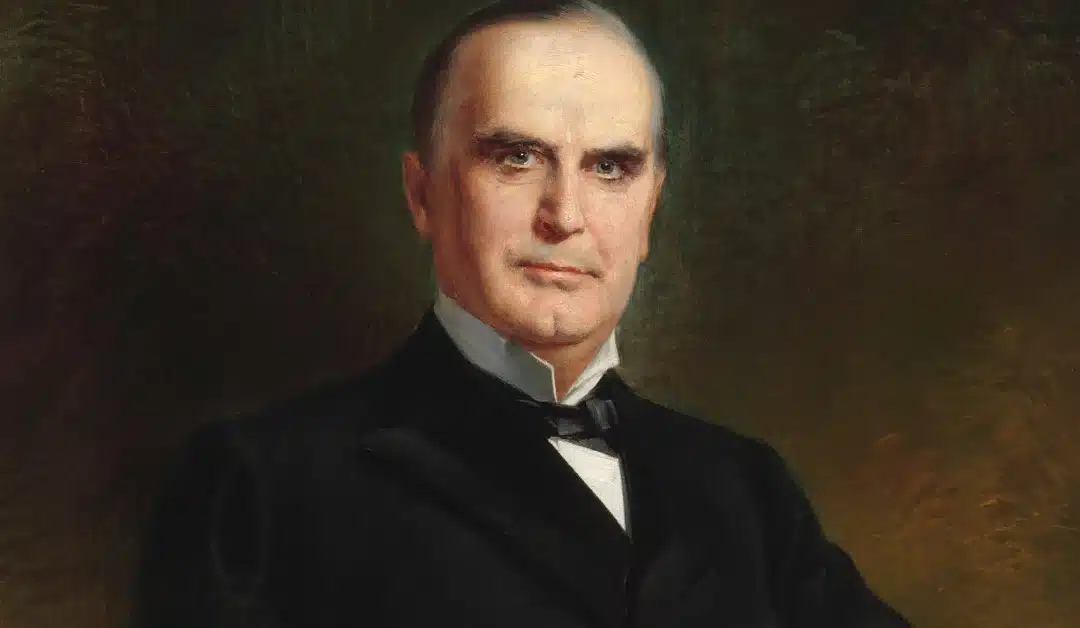Now what will hasten the day when our present advantages will wear out and when we shall come down to the conditions of the older and densely populated nations? The answer is: war, debt, taxation, diplomacy, a grand governmental system, pomp, glory, a big army and navy, lavish expenditures, political jobbery—in a word, imperialism. —William Graham Sumner
In his inaugural address on Monday, Donald Trump paid tribute to only one former president, William McKinley, No. 25, who Trump said “made our country very rich through tariffs and through talent.” He praised the Republican McKinley in touting his plan to take control, militarily if necessary, of the Panama Canal. McKinley, who was assassinated in 1901 and succeeded by Theodore Roosevelt, began the expansionist process that led to the canal’s construction. (No doubt Greenland was on Trump’s mind too.)
Perhaps Trump’s choice of a president to honor was revealing for another reason. McKinley took America to war against Spain in 1898. As the late historian Ralph Raico wrote, the war against Spain was “our first engagement with a foreign enemy in the dawning age of modern warfare. Aside from a few scant periods of retrenchment, we have been embroiled in foreign politics ever since.” It was the war that inaugurated the American empire and made the United States a Pacific power. The U.S. government took possession of Puerto Rico, Guam, and the Philippines, where it savagely repressed an independence movement from 1899 to 1902. It established influence over but did not annex Cuba.
The country burst with pride over America’s new world-power status. Well, not everyone. Some advocates of the old republicanism, with its pillars of individual liberty, free enterprise, and barely noticeable government objected. One of the best-known among them was William Graham Sumner, the Yale professor of sociology and laissez-faire liberal. In 1898 Sumner delivered a lecture at Yale with the shocking title “The Conquest of the United States by Spain.” After the stunning and quick military victory over the old Spanish empire, what could Sumner have meant?
He started by giving a preview:
Spain was the first, for a long time the greatest, of the modern imperialistic states. The United States, by its historical origin, its traditions, and its principles, is the chief representative of the revolt and reaction against that kind of a state. I intend to show that, by the line of action now proposed to us, which we call expansion and imperialism, we are throwing away some of the most important elements of the American symbol and are adopting some of the most important elements of the Spanish symbol. We have beaten Spain in a military conflict, but we are submitting to be conquered by her on the field of ideas and policies.
Sumner was asking: for what shall it profit a nation if it shall gain the whole world, and lose its own soul?
Sumner drew the stark contrast between Spain, “the first, for a long time the greatest, of the modern imperialistic states,” and the United States, “the chief representative of the revolt and reaction against that kind of a state.” Empire versus Republic. Which way, America?
I intend to show that, by the line of action now proposed to us, which we call expansion and imperialism, we are throwing away some of the most important elements of the American symbol and are adopting some of the most important elements of the Spanish symbol. We have beaten Spain in a military conflict, but we are submitting to be conquered by her on the field of ideas and policies.
Sumner was a secular prophet who respected the law of identity. A republic can not take on the features of an empire and remain unchanged in other ways.
Expansionism and imperialism are nothing but the old philosophies of national prosperity which have brought Spain to where she now is. Those philosophies appeal to national vanity and national cupidity. They are seductive, especially upon the first view and the most superficial judgment, and therefore it cannot be denied that they are very strong for popular effect. They are delusions, and they will lead us to ruin unless we are hard-headed enough to resist them.
He warned of the perils to liberty from the unintended consequences of foreign adventurism.
We talk about “liberty” all the time in a big and easy way, as if liberty was a thing that men could have if they want it, and to any extent to which they want it. It is certain that a very large part of human liberty consists simply in the choice either to do a thing or to let it alone. If we decide to do it, a whole series of consequences is entailed upon us in regard to which it is exceedingly difficult, or impossible, for us to exercise any liberty at all. The proof of this from the case before us is so clear and easy that I need spend no words upon it. Here, then, you have the reason why it is a rule of sound statesmanship not to embark on an adventurous policy. A statesman could not be expected to know in advance that we should come out of the war with the Philippines on our hands, but it belongs to his education to warn him that a policy of adventure and of gratuitous enterprise would be sure to entail embarrassments of some kind. What comes to us in the evolution of our own life and interests, that we must meet; what we go to seek which lies beyond that domain is a waste of our energy and a compromise of our liberty and welfare. If this is not sound doctrine, then the historical and social sciences have nothing to teach us which is worth any trouble.
But that was not all.
There is another observation, however, about the war which is of far greater importance: that is, that it was a gross violation of self-government. We boast that we are a self-governing people, and in this respect, particularly, we compare ourselves with pride with older nations. What is the difference after all? The Russians, whom we always think of as standing at the opposite pole of political institutions, have self-government, if you mean by it acquiescence in what a little group of people at the head of the government agree to do. The war with Spain was precipitated upon us headlong, without reflection or deliberation, and without any due formulation of public opinion. Whenever a voice was raised in behalf of deliberation and the recognized maxims of statesmanship, it was howled down in a storm of vituperation and cant. Everything was done to make us throw away sobriety of thought and calmness of judgment and to inflate all expressions with sensational epithets and turgid phrases. It cannot be denied that everything in regard to the war has been treated in an exalted strain of sentiment and rhetoric very unfavorable to the truth.
Sumner was pointing out that the war had not been a policy freely chosen by the American people. They were stampeded into it by glory-seeking, even if well-intended rulers supported by romantic newspapermen with their tales of horror, who do their best to manipulate public opinion and suppress dissent. Sound familiar?
At present the whole periodical press of the country seems to be occupied in tickling the national vanity to the utmost by representations about the war which are extravagant and fantastic. There will be a penalty to be paid for all this. Nervous and sensational newspapers are just as corrupting, especially to young people, as nervous and sensational novels. The habit of expecting that all mental pabulum shall be highly spiced, and the corresponding loathing for whatever is soberly truthful, undermines character as much as any other vice. Patriotism is being prostituted into a nervous intoxication which is fatal to an apprehension of truth. It builds around us a fool’s paradise, and it will lead us into errors about our position and relations just like those which we have been ridiculing in the case of Spain.
So what do Americans, who prosper through freedom, get out of the gore and glory?
Let us be well assured that self-government is not a matter of flags and Fourth of July orations, nor yet of strife to get offices. Eternal vigilance is the price of that as of every other political good. The perpetuity of self-government depends on the sound political sense of the people, and sound political sense is a matter of habit and practice. We can give it up and we can take instead pomp and glory. That is what Spain did…. She lost self-government and saw her resources spent on interests which were foreign to her, but she could talk about an empire on which the sun never set and boast of her colonies, her gold-mines, her fleets and armies and debts. She had glory and pride, mixed, of course, with defeat and disaster, such as must be experienced by any nation on that course of policy; and she grew weaker in her industry and commerce and poorer in the status of the population all the time. She has never been able to recover real self-government yet. If we Americans believe in self-government, why do we let it slip away from us? Why do we barter it away for military glory as Spain did?
Unless the nation changed course, the future would be bleak, despite the promise of glory.
The most important thing which we shall inherit from the Spaniards will be the task of suppressing rebellions. If the United States takes out of the hands of Spain her mission, on the ground that Spain is not executing it well, and if this nation in its turn attempts to be school-mistress to others, it will shrivel up into the same vanity and self-conceit of which Spain now presents an example. To read our current literature one would think that we were already well on the way to it. Now, the great reason why all these enterprises which begin by saying to somebody else, We know what is good for you better than you know yourself and we are going to make you do it, are false and wrong is that they violate liberty; or, to turn the same statement into other words, the reason why liberty, of which we Americans talk so much, is a good thing is that it means leaving people to live out their own lives in their own way, while we do the same. If we believe in liberty, as an American principle, why do we not stand by it? Why are we going to throw it away to enter upon a Spanish policy of dominion and regulation?
He concluded:
My patriotism is of the kind which is outraged by the notion that the United States never was a great nation until in a petty three months’ campaign it knocked to pieces a poor, decrepit, bankrupt old state like Spain. To hold such an opinion as that is to abandon all American standards, to put shame and scorn on all that our ancestors tried to build up here, and to go over to the standards of which Spain is a representative.
Sumner insisted that America could not be made into a great empire—with all the brutality and presumptuousness that implied—without killing what was best in America politically. The figure who signed the death warrant was President William McKinley—the man Trump would presumably nominate to the next vacancy on Mount Rushmore.

































